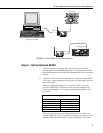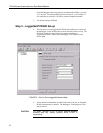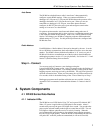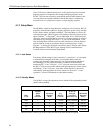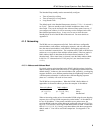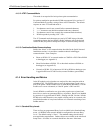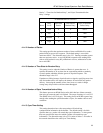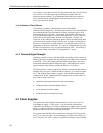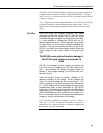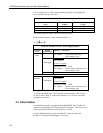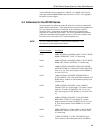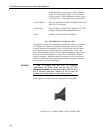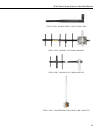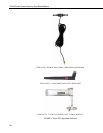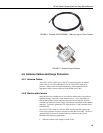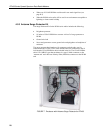
RF400 Series Spread Spectrum Data Radio/Modems
13
(CSI Item # 14291) with tinned leads to connect to power at the datalogger 12
V output terminals and barrel connector to plug into the RF400’s “DC Pwr”
jack. If 120 VAC is available at the site, the 120 VAC adapter alone (CSI Item
# 15966) is an option.
A 12 V supply may connect to either the RF400’s “DC Pwr” jack or CS I/O pin
8 (or both, since there is diode isolation between supply inputs). The 12 V
supply inputs are diode protected against the application of reverse polarity
power.
There are many AC adapters available with barrel
connectors (plugs) that will fit the RF400. Some of these
(including the CSI AC adapter Item # 272) will cause
immediate damage if plugged into the RF400 even briefly.
It is also possible to damage the RF400 with an AC
adapter labeled as low as “12 VDC” because it may output
an open-circuit (no current drain) voltage exceeding the
maximum. The very low quiescent current (170 uA) of the
RF400 in its default and other standby modes allows the
supply voltage to rise at times virtually to its open-circuit
level.
The RF400 series radio will sustain damage if
the DC Pwr jack voltage ever exceeds 18
Volts!
120 VAC line voltages vary from location to location and
from time to time so observing a 16.5 VDC maximum is
wise. Unconsidered AC adapter selection raises the
specter of over-voltage damage to the RF400 and non-
warranty repairs!
There are several things to consider. Beware of AC
adapters outputting an AC voltage. An AC adapter can
output the correct voltage but the wrong polarity. The
center conductor of the barrel connector must be positive
(+). The AC adapter must also be capable of supplying the
instantaneous peak currents demanded by the RF400
transmitter. The best approach is to obtain the AC adapter
recommended by CSI (Item #15966 or the RF400 Base
Station Cable/Power Kit Item # 14220 which contains it). If
this is not possible, obtain an AC adapter that matches the
voltage vs. current characteristics shown below.
To be sure that the candidate AC adapter’s “no load” voltage is
below the 16.5 VDC recommended maximum, measure the
output with a DC voltmeter while the AC adapter is plugged into
the outlet but not powering anything.
CAUTION



